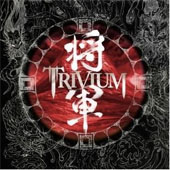 Release Date: September 30, 2008
Release Date: September 30, 2008
Reviewed by Evelyn Miska
In preparing for their fourth full-length album, Trivium had not only the initial challenge that comes with writing and recording a full-length album, but also the difficulty of surmounting the criticisms of their last album, The Crusade. Some fans criticized the band for selling out and changing their style to suit the industry’s desires and the more melodic vocal approach by Matt Heafy was dismissed as not being “metal enough”. With such baggage, it would have been easy for Trivium to either write their long-time fans off and continue in their new direction or revert to their old style and restrict growth and development. Rather than choose either of those options, Trivium attempted to find a middle ground and the result is an album filled with complicated guitar riffs and solos, layer upon layer of harmonies and Heafy’s balance of metal growls and melodic singing.
After a somewhat deceptively calm introduction to the opener, “Kirisute Gomen,” Shogun begins in earnest. Immediately listeners are immersed in the type of sounds Trivium became best known for, fast guitar parts, growled lyrics and intense drumming. However, rather than keep up that approach for the entire six and a half minutes of the song, Trivium switches gears halfway through with a more melodic interlude that focuses on tight vocal harmonies for Heafy, Corey Beaulieu and Paolo Gregoletto. Lest this be deemed too frivolous by metal fans, what follows is an intense guitar solo worthy of the metal label.
Fond of somewhat obscure literary references, songs such as “Torn Between Scylla And Charybdis,” “Of Prometheus And The Crucifix” and “Like Castillo To A In Heaven” refer to these tales while using them as analogies for the struggles of modern man. Each of the songs is huge and somewhat bombastic, but fittingly so for such tales of larger than life characters and monsters. While many listeners may not understand the references, it is still somewhat refreshing for a band to be making such allusions to Greek mythology.
Trivium’s fourth album has an undoubtedly huge sound and while part of that might be to appease fans who were critical of The Crusade, the band hasn’t capitulated entirely to those demands. What one hears on Shogun is progress and development, which is vital for the continuation of any artist. Some fans might not appreciate this development, but if they want Trivium to be around for albums beyond Shogun, that creative process is necessary.


Leave a reply